News from Maison de la Gare
Critical Health Care for Talibé Children
Tweeter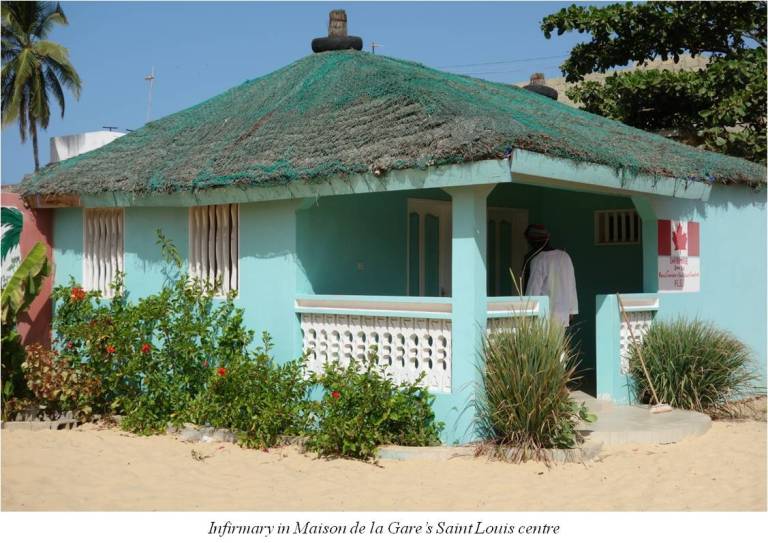
Medications for Life
An important part of the vision
for Maison de la Gare is a medical clinic to support the health of the talibé
children. The clinic provides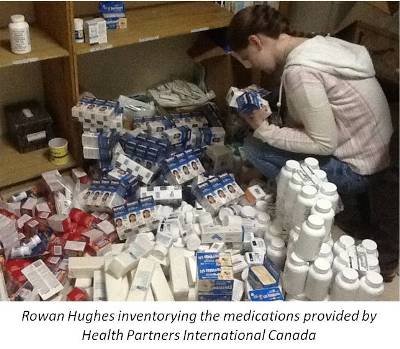 a base from which volunteers and staff can venture
into the community to deliver health care to talibé children in their daaras and
on the streets, while spreading the word among the talibés that help is available
and building local confidence in Maison de la Gare.
a base from which volunteers and staff can venture
into the community to deliver health care to talibé children in their daaras and
on the streets, while spreading the word among the talibés that help is available
and building local confidence in Maison de la Gare.
Construction of the clinic was made possible by a grant from the
Canada Fund for Local Initiatives and donation of architectural drawings
by the Canadian firm Civitas. International volunteers involved in the medical
program often make valuable contributions of medical supplies, and the on-going
costs of medical supplies purchased in Senegal are funded by the United Nations
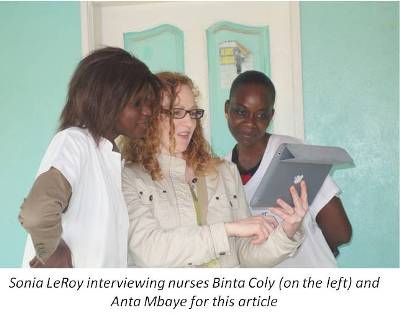 anti-slavery fund,
the Global Fund for Children, and other international donors.
Critically, many of the essential drugs and medications for the clinic's pharmacy
are provided by Health Partners International Canada, an NGO, and are
transported to Senegal on a regular basis by partners travelling from Canada.
anti-slavery fund,
the Global Fund for Children, and other international donors.
Critically, many of the essential drugs and medications for the clinic's pharmacy
are provided by Health Partners International Canada, an NGO, and are
transported to Senegal on a regular basis by partners travelling from Canada.
Conditions in the daaras where the children are forced to live lead to serious
medical issues. Cramped quarters spread disease and parasites.
Unsanitary conditions are responsible for frequent infections. Poor hygiene
and malnutrition cause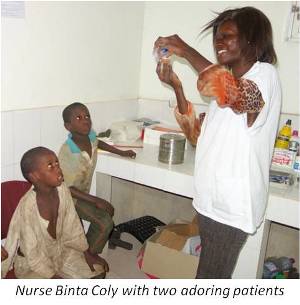 multiple disorders. Tooth abscesses are frequent. Nurse
Binta Coly explains that the children do not have their health care needs met
by their marabouts and they rely on Maison de la Gare to treat common burns,
cuts, parasites, infections and disease.
multiple disorders. Tooth abscesses are frequent. Nurse
Binta Coly explains that the children do not have their health care needs met
by their marabouts and they rely on Maison de la Gare to treat common burns,
cuts, parasites, infections and disease.
The nurses understand that talibés who come to Maison de la Gare for medical
attention spread the word in their communities and daaras. Such word of mouth
brings even more children to Maison de la Gare for care. But, not all children
are able to come to the centre for help, Binta points out. Sometimes it is
too far for the kids to walk, or 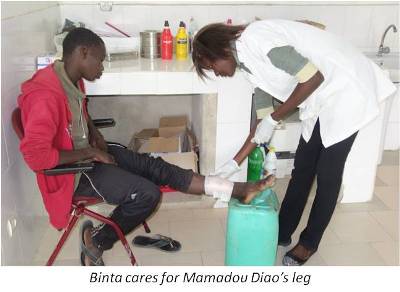 they are too sick to travel. In these cases,
Binta or medical volunteers walk to the daara to deliver treatment. If the
child's condition is more serious than can be addressed on site, he will be
transported to the hospital. Several children per month, on average, require
such hospitalization. In these cases, Maison de la Gare pays the hospital
bill to ensure the children receive the care they need.
they are too sick to travel. In these cases,
Binta or medical volunteers walk to the daara to deliver treatment. If the
child's condition is more serious than can be addressed on site, he will be
transported to the hospital. Several children per month, on average, require
such hospitalization. In these cases, Maison de la Gare pays the hospital
bill to ensure the children receive the care they need.
When a talibé who is regularly involved in Maison de la Gare’s programs,
Mamadou Diao, broke his leg badly in two places, the staff took him directly
to the hospital for treatment. His leg healed badly and an infection developed,
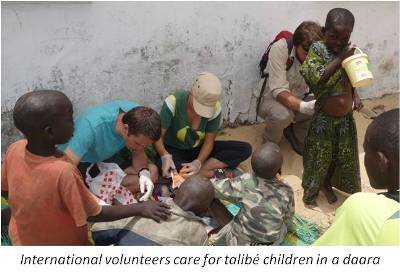 not surprising
given the children's living conditions.
Since that time nurses Binta and Anta have cared for him daily to ensure his
successful recovery.
not surprising
given the children's living conditions.
Since that time nurses Binta and Anta have cared for him daily to ensure his
successful recovery.
The nurses comment that what often starts as a simple scrape or cut quickly
can become infected, given the unsanitary conditions these children return to
each night. Furthermore, most of the kids don't have shoes. So, a cut on a
foot does not stand a chance of healing cleanly unless treated immediately,
with dressings reapplied daily. Many of the cases that the
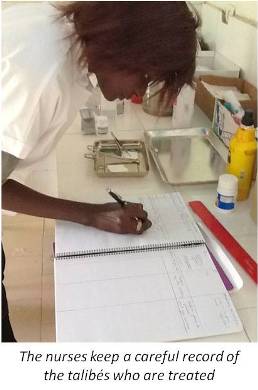 Maison de la Gare
nurses see are already infected and need antibiotic treatment. A simple cut
for a talibé can lead to loss of limb or even loss of life if left unattended.
Maison de la Gare
nurses see are already infected and need antibiotic treatment. A simple cut
for a talibé can lead to loss of limb or even loss of life if left unattended.
Maison de la Gare is fortunate to benefit from the participation of
international volunteers in the medical program. Volunteers work at the clinic
side by side with Binta and Anta. One of the great benefits of volunteer
participation is the possibility to expand medical outreach to visit
more children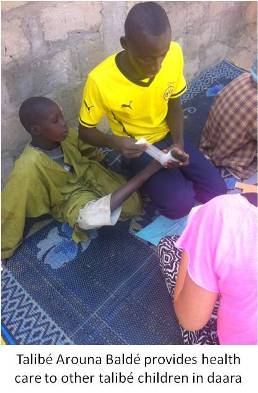 in more daaras. Even volunteers
with medical training can be unfamiliar with some of the medical issues common
to the talibés. Before volunteers venture out into the community, nurse Binta
Coly instructs them on the common issues encountered in the field and proper
uses of medications, and ensures that they are properly equipped.
in more daaras. Even volunteers
with medical training can be unfamiliar with some of the medical issues common
to the talibés. Before volunteers venture out into the community, nurse Binta
Coly instructs them on the common issues encountered in the field and proper
uses of medications, and ensures that they are properly equipped.
Some of the older talibés accompany the medical excursion groups, leading them
to the daaras of children in need. A few of these older boys have become
familiar with the methods of treatment for common talibé ailments, and have
begun to participate in 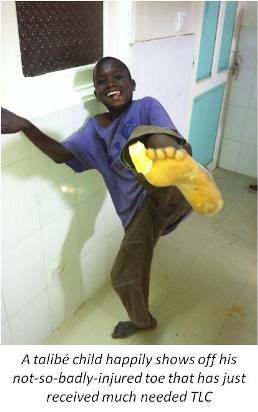 health care activities themselves. They are developing
a keen interest in health care and are acquiring useful skills as well as
providing valuable assistance.
health care activities themselves. They are developing
a keen interest in health care and are acquiring useful skills as well as
providing valuable assistance.
The staff and volunteers alike are sensitive to the fact that talibé children
crave recognition and affection.
Sometime children present themselves at the
clinic or in the daaras without clear health care needs. In these situations,
Binta says that it is still important to treat them with respect and affection.
She will clean the "pretend wound" knowing that she is treating a wounded
spirit, sending away a smiling, satisfied talibé. The talibé children of
Saint Louis are coming to know they can rely on Maison de la Gare.
















